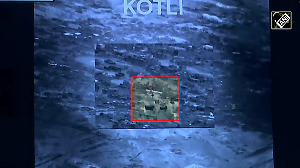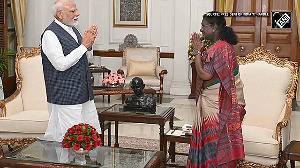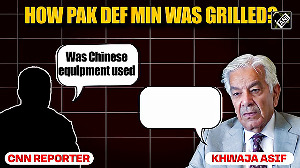Incidents such as the violent clashes in Assam only tell us that we need to sensitise the youth about our country -- especially the borders states -- of which they have very vague notions, says educator Chitra Jeyakumar
The Norwegian national who was recently convicted for the mass murder of several innocent children and his lack of remorse at the court has something common with the public reaction to the ethnic violence that broke out in Assam. In order to understand the connection, one will have to understand the causes behind the two seemingly remote incidents.
On Friday, August 24, a court in Oslo sentenced Anders Behring Breivik to 'preventive detention' for having brutally massacred young teenagers at a summer camp in July last year.
Breivik however seemed unrepentent and with his defiant, fisted salute to the court, accepted the sentence as a badge of honour. Apparently, Breivik felt the need to take such a violent step to convey his deep discontentment towards the government for its open and soft stance towards the 'threat' of Muslim immigrants in Norway.
Closer at home the fragile peace in the northeast part of India, was shattered with ethnic clashes between the majority Hindu Bodos population (from Assam) and Bengali-speaking Muslims.
For far too long these Muslims, a minority in the region, have been considered to be 'illegal immigrants' from Bangladesh. The impact of the conflict was felt not only in Assam but also in the metros of India, namely Bengaluru and Pune, where rumours coupled with violent threats played mischief to spread panic among the northeastern community, chiefly students and employees.
As a result, thousands fled the cities to their homes in the north-east a few days before Id-ul-Fitr making, it perhaps the largest exodus since the Partition of India in 1947.
As the world shrinks into a global village, with more people leaving their homes to other states and countries for better job and living conditions, violent clashes such as the ones mentioned above are going to become a rule than an exception.
In such a vitiated atmosphere, our responses and reaction will define the complexion of the world we are going to create for our children. Several people in both Bengaluru and Pune have already set an example by assuring their brethren from the northeast of safety and help during those crucial days.
Meanwhile the court has punished the horrific action in Oslo. Back home, the legislator in Assam allegedly responsible for the ethnic violence, has been arrested.
However, the legal action will prove to be superficial if society at large,remains inactive and indifferent towards the questions of immigrants, be it within a country or without.
No society has ever grown or developed without the contribution of its immigrant population. The city of Mumbai owes its prosperity to the Parsis and Gujarati Muslims, both immigrants.
Therefore, the question is not whether to permit immigrants into cities and countries, specially in a globally interdependent world today. In saying so, one is not condoning illegal immigrants.
Let the law take its course here. However, this should not be an excuse to ostracise perfectly legal immigrants in a state or a country.
Instead, the task ahead is to change one's outlook towards immigrants and accept them, despite the diversity in culture and outlook, as a positive force in building a vibrant and cosmopolitan society.
In this context, the role of the educator becomes extremely challenging. For along with imparting the skills required for a brave new close-knit world, he/she will have to sow the seed of tolerance and respect for diverse cultures and people in young minds, in accordance with the old adage of: 'Charity begins at home'.
Let us commence by sensitising young people about our own country -- specially its border states -- of which they have very vague notions. So while they study about world history, let them also be acquainted with the cultural and historical contribution of the north-eastern people.
The writer is an educator with an international school.










